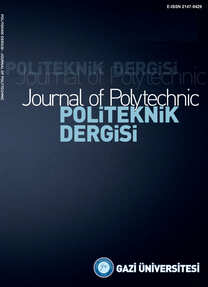Fotovoltaik Güneş Santrallerinde Şebeke Bağlantı Sorunları ve Çözümleri
Güneş enerjisi, şebeke sorunları, FV
Problems and Solutions of Grid-Connected in Photovoltaic Solar Plants
Solar energy, grid problems, PV,
___
- [1] GÜNDER, 2019, https://www.solar.ist/2018-yilinda-turkiyenin-gunes-enerjisi-kurulu-gucu-5-063-mwye-ulasti/[2] Farhoodnea, M., Mohamed, A., Shareef, H., Zayandehroodi, H., 2013, Power quality analysis of grid-connected photovoltaic systems in distribution networks, Przeglad Elektrotechniczny (Electrical Review), 208-213.[3] Malathy, S., Ramaprabha, R., Reconfiguration strategies to extract maximum power from photovoltaic array under partially shaded conditions, Renewable and Sustainable Energy Reviews, 81(2):2922-2934, 2018.[4] Jalilisaatlou, R. “Fotovoltaik Güç Sistemlerinin Kalite Karakteristiklerinin Ölçülmesi ve Değerlendirilmesi”, Yüksek Lisans Tezi, Ege Üniversitesi Fen Bilimleri Enstitüsü, İZMİR, (2015)[5] Akdeniz, E., “Yenilenebilir Kaynaklardan Enerji Üretiminin Şebekenin Enerji Kalitesi ve Kararlılığına Etkilerinin İncelenmesi”, (Yüksek Lisans Tezi), İstanbul Teknik Üniversitesi Fen Bilimleri Enstitüsü, İstanbul, (2006)[6] Tan, Y.T.,“Impact on the Power System with a Large Penetration of Photovoltaic Generation”, (PhD Thesis), University of Manchester, February, (2004)[7] Bellia, H., Youcef, R., Mouley, F., “A detailed modelling of photovoltaic module using MATLAB”, National Research Institute of Astronomy and Geophysics Journal, 53-61, (2014)[8] Doğan, S, “Şebeke Etkileşimli Fotovoltaik Güç Sistemlerinin İncelenmesi ve Simülasyonu”, (Yüksek Lisans Tezi), Kocaeli Üniversitesi Fen Bilimleri Enstitüsü, Kocaeli, (2018)[9] Çubukçu, M., “Türkiye’nin Farklı Konumlarında Farklı Topolojilerde Fotovoltaik-Rüzgar-Yakıt Pili Hibrid Güç Sistemlerinin Modellenmesi Karşılaştırmalı Simülasyonu ve Uygulamalı Performans Analizi”, (Doktora Tezi), Ege Üniversitesi Güneş Enerjisi Enstitüsü, İzmir, (2011)[10] Peren, V., “Fotovoltaik Su Pompalama Sistemi Tasarımı ve Modellenmesi”, (Yüksek Lisans Tezi), Kocaeli Üniversitesi Fen Bilimleri Enstitüsü, Kocaeli, (2016)[11] Kandemir, Ç., Bayrak, M., “Fotovoltaik Sistemler Şebekeye Bağlı Olduğunda Oluşan Sorunlar”, Elektrik Mühendisleri Odası [12] Bayrak, G., “A remote islanding detection and control strategy for photovoltaic-based distributed generation systems”, Energy Conversion and Management 96: 228-241, (2015)[13] Bayrak G., Cebeci M., “Şebeke Bağlantılı PV Güç Sistemlerinde Ada Modlu Çalışma ADMÇ ve Tespit Yöntemleri”, Otomatik Kontrol Türk Milli Komitesi Ulusal Toplantısı, Türkiye, 26-28, (2013)[14] IEA International Energy Agency, “Evaluation of Islanding Detection Methods for Photovoltaic Utility Interactive Power Systems, in Task V Report”, (2002)[15] Yılmaz, A., “Şebeke Bağlantılı Fotovoltaik (PV) Sistemlerin Mevcut Elektrik Şebekesi Ile Entegrasyonu Ve Güç Sistemine Etkileri”, (Yüksek Lisans Tezi), Elektrik Elektronik Mühendisliği Anabilim Dalı, (2018)[16] http://www.emo.org.tr/ekler/0f027d0cc62ecbd_ek.pdf[17] “Electromagnetic Compatibility (EMC), Limits – Limitation Of Voltage Changes, Voltage Fluctuations And Flicker In Public Low-Voltage Supply Systems, For Equipment With Rated Current ≤ 16 A Per Phase And Not Subject To Conditional Connection”, IEC 61000-3-3, (2002)[18] IEEE Std 519, “IEEE recommended practices and requirements for harmonic control in electrical power systems”, (2014)[19] EPDK, “Elektrik piyasasında lisanssız elektrik üretimine ilişkin yönetmeliğin uygulanmasına dair tebliğ”, T.C. Resmi Gazete, 28783, (2013)[20] Hernández, J. C., Ortega, M. J., De la Cruz, J., and Vera, D., “Guidelines for the technical assessment of harmonic, flicker and unbalance emission limits for PV-distributed generation”, Electric Power Systems Research, 81(7), 1247-1257, (2011)
- ISSN: 1302-0900
- Yayın Aralığı: Yılda 4 Sayı
- Başlangıç: 1998
- Yayıncı: GAZİ ÜNİVERSİTESİ
Heterojen Sürtünme Katsayılı Kayma Temas Problemleri için bir Sonlu Elemanlar Çözümü
METİN YURDDAŞKAL, Uğur KARTAL, Eyyüp Can DOLUEL
Kule Tipi Yapıların Dinamik Davranışının Belirlenmesi: Kırklareli Hızırbey Camii Minaresi Örneği
İsmail KILIÇ, Kanat Burak BOZDOĞAN, Süleyman AYDIN, Saadet Gökçe GÖK, Safiye GÜNDOĞAN
Çarpık ve parçalı mıknatıs geometrileri kullanarak vuruntu torku minimizasyonu
Erol KURT, Nihat ÖZTÜRK, Adem DALCALI, Emre ÇELİK
Borlanmış % 5 Mg Katkılı Ni-Mg Alaşımının Yüzey Özelliklerinin İncelenmesi
Mehmet GUL, Faruk SERIN, Metin ERTURKLER
Zekeriya DABAN, ERTUĞRUL DURAK
Kullanılmış Ni-Mo Hidrodesülfürizasyon Katalizöründen Nikel Okzalat Dihidrat Üretimi
Östemperleme İşleminin CBN Kesici Takım Gerilmeleri Üzerindeki Etkisinin Nümerik Simülasyonu
